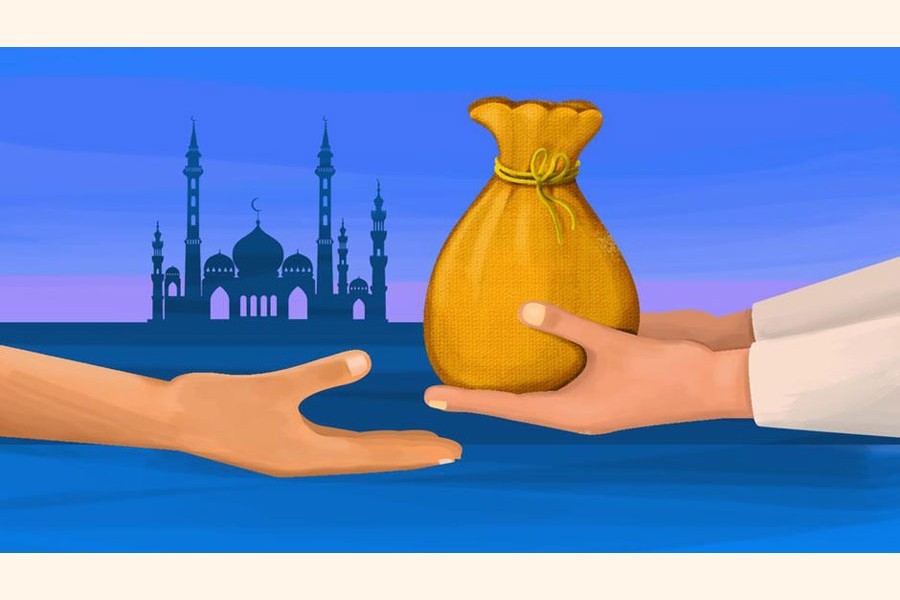The importance of Zakat in Islam is well known to all. This is the mandatory charity for solvent Muslims who have minimum amount of wealth after his or her own consumption. The core idea behind the Zakat is to share the wealth of the rich and the solvent with the poor and the needy. Those who have the minimum threshold of wealth, known as Nisab in Islamic lexicon, are liable to pay at least 2.5 per cent of the Nisab amount or surplus wealth. Nisab may be calculated following gold or silver standard. Having at least 85 grams of gold or 595 grams of silver and/or equal amount of financial assets at the end of lunar year is considered as Nisab. Zakat payer may follow any of the standards to estimate Nisab of the financial assets and consequently of the Zakat due to him/her.
The Quran has clearly set eight categories of people who are eligible to receive Zakat annually. Verse 60 of Sura Tawbah says: "The charities are only for the poor and the needy, and those employed to collect them, and those whose hearts are to be reconciled, and for [the freedom of] the slaves and the debtors, and in the way of Allah, and for the traveller. [This is] an ordinance from Allah, and Allah is all-knowing, all-wise."
In other words, those who belong to any of the categories are eligible to receive Zakat. It is, however, not always easy to identify the right person to hand over Zakat. Someone who seems to be poor and needy may not actually be in need of Zakat money for various reasons. For instance, he may be used to spend resources wastefully instead of utilising those according to his need. So he becomes poor and seeks Zakat. By getting Zakat, he again misuses the money by not repaying debt. That's why it requires some cautious approach to pay Zakat as the ultimate objective of the obligatory charity is to improve the financial condition of the receivers in the long run. Zakat needs to be paid or distributed in such a manner that the recipient will not be reliant on the charity in the near future and will be transformed into a Zakat donor in the long run. In this process, a good number of people may be uplifted above the poverty line gradually.
To achieve the goal, there are two challenges. The first one is mobilising the Zakat systematically. Besides the government Zakat fund, many non-government and private organisations are currently mobilising Zakat so that the eligible people can get the Zakat due to them. There was a time when some people used to distribute some clothes during Ramadan in the name of Zakat to the poor causing trouble for them. The ensuing stampede in some cases would lead to tragic death of many Zakat receivers. Though the practice has now declined significantly, this kind of giving is still observed which clearly goes against the spirit of Zakat.
Welfare organisations like Anjuman Mufidul Islam, As-Sunnah Foundation, Dhaka Ahsania Mission and Quantum Foundation are collecting and distributing Zakat. The organised mobilisation of Zakat is important to make it effective in the long run and reduce the risk of misuse or underuse. Then there is a organisation like Center for Zakat Management (CZM) which is a pro-poor social enterprise. The declared aim of CZM is to promote the 'obligation of Zakat ordained by Allah as an economic tool for bringing prosperity to the needy.'
Recognising the role of these charitable organisation on mobilising Zakat, the government has recently adopted 'Zakat Fund Management Act, 2022' by repealing Zakat Fund Ordinance 1982. The cabinet has already approved the new law with some changes. The law ministry is now finalising the draft which will be placed in the national parliament soon. Hopefully, the new act will provide a better legal framework to collect and distribute Zakat by different organisations in a transparent manner.
The surge in mobile financial services, agent banking activities and online banking has made financial transaction and transfer across the country easier, faster and efficient. These services also bring most of the financial transactions under the formal channel and make those traceable and secure. So, these become effective tools to mobilise Zakat. The charitable organisations are now using these channels to collect Zakat.
As collection of Zakat becomes easier now, it is the distribution that poses bigger challenges to all. In fact, proper distribution of resources is always challenging and theories of economics try to find solutions in this connection.
Usually, it is not possible for individuals to go door to door to find the eligible recipient of Zakat. That's why many people want to rely on some trustworthy organisations to distribute their Zakat properly. Though many individuals usually pay or distribute Zakat by themselves, a portion of the obligatory charity needs to be disbursed institutionally. It is because an institution has the capacity to identify the needy and also monitor the use of the money. Some organisations are now helping the poor and the needy to become self-reliant by setting up a tiny business, shop or providing easy bikes using the Zakat collected from others. This kind of support needs some supervision for the time being.
Thus, developing institutional capacity is critical to distribute Zakat to those who need it. Good governance is also a necessary condition in this connection. Moreover, the government also needs to prepare a national database of Zakat collecting and distributing organisations and keep it open for all. This will help Zakat payer to find and contact any organisation. The organisations also need to disclose the amount of Zakat collected and disbursed annually. The brief disclosure should also be available online. Being a faith-based approach, work on Zakat has to be transparent and also in compliance with religious directives.


